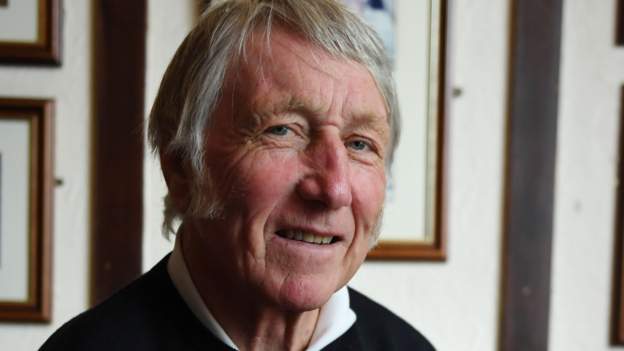Ειδήσεις Ελλάδα
JPR Williams’ playing style – and appearance – made him one of rugby’s most distinctive players
Not many people are known simply by their initials. Not many people played rugby like JPR.
The legendary Wales and British and Irish Lions full-back, John Peter Rhys Williams, was one of those special sporting stars.
Williams, who has died aged 74, was a fearless competitor and daring attacker.
He was an icon of Wales’ dominance of the 1970s, winning three Five Nations Grand Slams.
Instantly recognisable with his flowing hair and sideburns, he won 55 caps between 1969 and 1981.
Williams was also a part of the Lions’ historic winning tours of New Zealand in 1971 and South Africa in 1974.
Although he retired from international rugby in 1981 to concentrate on his other career as an orthopaedic surgeon, he kept turning out occasionally for home club Bridgend into the 1990s and even played for local side Tondu’s third team in his fifties before finally hanging up his boots in 2003.
That longevity was typical of Williams’ indomitable spirit. He was a warrior on the field and a charismatic, straight-talking character off it.
Born near Bridgend in 1949, Williams was educated at Bridgend Boys Grammar School – now Brynteg Comprehensive School – before earning a place at the prestigious Millfield School in Somerset, where his future Wales team-mate Sir Gareth Edwards was also a student.
JPR Williams scores against England as Wales win Grand Slam
Williams was an accomplished tennis player in his teens, winning a British junior competition held at the venue which hosts Wimbledon, the All England Lawn Tennis and Croquet Club.
Over the years, that achievement morphed into a myth that Williams won Junior Wimbledon in 1966, though records show the champion that year was Vladimir Korotkov.
Williams turned his attention to rugby, which had the added benefit of being an amateur sport and would therefore allow him to pursue a career in medicine.
Having impressed with Bridgend and then London Welsh, Williams made his Wales debut as a 19-year-old in 1969 and won the Five Nations Championship in his first campaign.
The first of three Grand Slams followed in 1971 and, later that year, he played all four Tests as the Lions secured what is still their only series win in New Zealand.
His impressive contribution included a long-range drop-goal in the drawn fourth Test which helped clinch the series 2-1.
JPR Williams in action on the British and Irish Lions’ tour of South Africa in 1974
Like Edwards, Barry John and Phil Bennett, Williams was as renowned for his Lions exploits as he was his achievements with Wales.
The next tour, of South Africa in 1974, would become similarly etched in Lions folklore as the visitors won 21 of their 22 matches, drawing one of their four Tests against the Springboks.
It was a brutal series marred by on-pitch violence, with match officials doing little to control it and the relative absence of cameras compared to the modern game making retrospective punishment unlikely.
The Lions adopted the now infamous ’99 call’ of instant retaliation where, if one player hit back at a Springbok, all other Lions were expected to join in the melee or hit the nearest opponent.
Williams typified the gung-ho approach when he ran half the length of the field to attack the considerably bigger lock, Moaner van Heerden, an act which summed up the full-back’s lack of regard for his own safety – but also one of which he later said he was not proud.
The 1976 Five Nations was a vintage year for Williams, who scored two excellent tries as Wales beat England at Twickenham to set the ball rolling for another Grand Slam.
He bookended this with a famous shoulder-barge tackle on France wing Jean-Francois Gourdon in the final victory in Cardiff.
A third clean sweep followed in 1978, with Williams again ever-present as Wales said farewell to two of its greatest players, Edwards and Bennett, and contemplated the beginning of the end of its golden era.
That would prove to be Wales’ last Grand Slam until 2005, though Williams did help them win another title in 1979.
He retired from international rugby in 1981 but his bloody-minded determination remained as he played for Bridgend. He was often seen with blood on his face but carrying on regardless.
After retiring, Williams concentrated on his work as a surgeon and, in his spare time, was a member of the Bridgend Tabernacle choir.
A man who enjoyed real ale and classical music, Williams did not work as a pundit as often as some of his peers but, when he was asked for his opinion, he did not hold back.
He particularly enjoyed reminding Wales’ more recent crops of his record against England – never on the losing side in 11 Tests and with five tries to his name, a competitor to the last.



